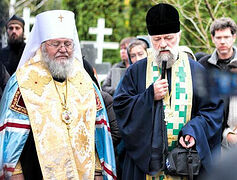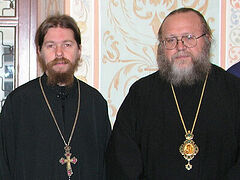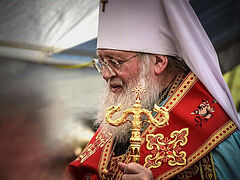 Seminarian Igor Kapral This article was published first in Russian on the fortieth day of the repose of the First Hierarch of the Russian Church Outside Russia, Metropolitan Hilarion (Kapral).
Seminarian Igor Kapral This article was published first in Russian on the fortieth day of the repose of the First Hierarch of the Russian Church Outside Russia, Metropolitan Hilarion (Kapral).
The courtyard of Jordanville Monastery, filled with the chiming of bells and the deafening chirping of birds, which in America happens only at Pascha time. Heard are the voices of people who are not at all sad: “Christ is Risen!” Adults—monks and laity—and children of different ages; locals and visitors from all over America, Canada, and Ukraine. They have all come to bid farewell to their mentor, man of prayer, uncle, great-uncle and—despite his high rank—a friend to everyone.
Vladyka’s great-niece Mariana Kosyanyuk (Turchak), his Canadian niece Cindy Mears, and I went down to the lower church under the Holy Trinity Cathedral. Here at the kliros, Vladyka used to pray during Lenten Liturgies.
 Bishop Hilarion in the village of Obenizhy, 1990s He did not know his grandfather: Mark Kapral died immediately after the emigration of his son Alexei (Vladyka’s father) in 1929 to Canada. No fewer trials awaited the other relatives who then remained in Volhynia than the young emigre couple who were married shortly before their departure.
Bishop Hilarion in the village of Obenizhy, 1990s He did not know his grandfather: Mark Kapral died immediately after the emigration of his son Alexei (Vladyka’s father) in 1929 to Canada. No fewer trials awaited the other relatives who then remained in Volhynia than the young emigre couple who were married shortly before their departure.
His mother’s brother Mark lost his arm in the war and became disabled. Of his four children, Vladyka’s cousins Valentina and Oksana now live in Obenizhy—the native village of the Kasyanyuks and the Kaprals in the Volhynia region in Ukraine.
On arriving in Canada, the newlyweds stopped briefly in Edmonton and then moved north, where they settled in the town of Spirit River, and where they had seven children, of whom Igor Kapral (the future Vladyka) was the youngest.
If I were to write Metropolitan Hilarion’s colorful biography, perhaps I would write that his the name of his birthplace became providential for the future monk—although the legends of local natives give their own varying interpretations of the town’s name.
Survival was very hard for the emigrants who in those years were invited by the Canadian Government to make the northern regions habitable. The family lived in a house they built themselves. They worked on simple farm nearby: They raised chickens, cows, pigs, ducks and geese; they grew wheat, oats and barley. They would go to a spring for water. Even as a bishop, Vladyka often recalled how in winter he and his classmates would go to school in a neighboring town on a sleigh, and in order not to freeze the children covered themselves with blankets.
Such a humble and hard childhood formed the future metropolitan’s modest tastes and habits.
Emigration brought other changes to the family’s everyday life. In Canada Vladyka’s mother Euphrosynia became “Rose”; his father became “Alex”; one of his sisters, Anastasia, was called Nancy outside the family; and Igor was often called Greg.
A family reunion
His great-niece Mariana Kosyanyuk (Turchak) relates:
Vladyka always kept in touch with his family in Ukraine. And once the opportunity arose, he began to travel to the holy and historical sites of Ukraine always stopping at his cousins’, Oksana, and my grandmother Valentina. Vladyka undertook the mission to unite the family1—first from America, then from Australia, where he was sent in 1996 as an archbishop, and then again from America, where he returned as the First Hierarch of ROCOR. He compiled a genealogy of our family and acquainted all the relatives with each other—representatives of different branches from both the maternal and paternal lines. Many of us hadn’t even known about one another. Now we communicate electronically as far as possible.
 Great-niece Mariana and great-nephew Dmitry Turchak I first met Vladyka in Obenizhy in the early 1990s, when he was Bishop of Manhattan. He was staying with my grandmother’s sister, Oksana Senechko, in the same house where the Kasyanyuks lived and from where Vladyka’s parents had moved to Canada during the Polish occupation. The church where Alexei and Euphrosynia were married is in Obenizhy too.
Great-niece Mariana and great-nephew Dmitry Turchak I first met Vladyka in Obenizhy in the early 1990s, when he was Bishop of Manhattan. He was staying with my grandmother’s sister, Oksana Senechko, in the same house where the Kasyanyuks lived and from where Vladyka’s parents had moved to Canada during the Polish occupation. The church where Alexei and Euphrosynia were married is in Obenizhy too.
Then he visited Ukraine several more times with his older sister Anna, who lived in the Canadian city of Calgary, in the same area where Igor Kapral was born and lived before entering the seminary. Vladyka greatly helped his native village and the Church of the Exaltation of the Cross financially, and he served there whenever he visited. Thanks to him, heating was installed in the local school.
In New York City, where I came to work, we first met with Vladyka in 2010. Emigration is always difficult. When I arrived, it was hard morally and financially. I was far from my family, everything was new, and there were no friends or relatives near me. Vladyka was like a close relative to me and helped me have faith in myself in a new place.
In Ukraine I worshipped in the same church that my grandmother had attended, and in New York I attended the Synodal Cathedral of Our Lady of the Sign, but not everything was clear to me in church life. Vladyka explained the faith to me and encouraged me; He told me to hope for the better even in the hardest situations. He was always an optimist, and this optimism was transmitted to us. His blessing and prayers also helped very much.
After I had moved to New York, my younger brother Dmitry and I would come to Vladyka for the Nativity to sing kolyadki (Ukrainian Christmas carols). He asked us in advance to find many kolyadki from different regions. I remember when I was a girl he would come to Ukraine, and we would sing to him “Many years” in our local chant, which he really liked.
Many say how approachable Vladyka was and how easy it was to meet with him. But now I understand that he always had plenty of work and I was always ashamed to disturb him. During our meetings I tried to have time to tell him everything. And Vladyka was always willing to help. It was like a family reunion.
A letter to Heaven
Mariana relates:
Interestingly, the year when Vladyka first came to Obenizhy, his cousin Oksana gave birth to a son, who was named Igor after Vladyka. It was significant for him, and he rejoiced very much. When Igor grew up, he corresponded with Vladyka probably more than anyone else in our family did.
Igor Senechko relates:
When I learned that I was named Igor after Vladyka,” I began to correspond with him and permanently felt an inalienable spiritual connection with Vladyka Hilarion, who loved the Ukrainian land, its hospitality, and its kind and hardworking people. Vladyka came to Obenizhy for the second time in 1998, and I remember shaking his hand shyly and telling enthusiastically him about rural life.
These are unforgettable moments from my childhood. From that time on I often wrote to Vladyka and told him about all the events in the life of our family. I would even send him my poetry. With incredible awe and love I remember Vladyka’s every visit to Ukraine. He visited many historic places, monasteries and churches, meeting with people who loved him.
 Igor Kapral with his sister Anastasia Although he was of a high Church rank and communicated with influential people, Vladyka Hilarion was a very modest person and especially loved ordinary villagers. He was interested in church archeology, the history of his church, family, and village. He researched his genealogy up to the tenth generation! At his own expense Vladyka published a book by the local historian Zinovy Yarmolyuk, An Outline of the History of the Village of Obenizhy. On every visit to the village the metropolitan went to our cemetery to bow to our ancestors’ graves. He provided all possible financial assistance to the local school and the Church of the Exaltation of the Cross, built in 1821. In his native village Metropolitan Hilarion wanted to set up a local history museum in the wooden house of his relatives, which has survived to this day.
Igor Kapral with his sister Anastasia Although he was of a high Church rank and communicated with influential people, Vladyka Hilarion was a very modest person and especially loved ordinary villagers. He was interested in church archeology, the history of his church, family, and village. He researched his genealogy up to the tenth generation! At his own expense Vladyka published a book by the local historian Zinovy Yarmolyuk, An Outline of the History of the Village of Obenizhy. On every visit to the village the metropolitan went to our cemetery to bow to our ancestors’ graves. He provided all possible financial assistance to the local school and the Church of the Exaltation of the Cross, built in 1821. In his native village Metropolitan Hilarion wanted to set up a local history museum in the wooden house of his relatives, which has survived to this day.
He was very fond of Ukrainian cuisine and songs, which his mother had probably taught him.
When on May 16, the feast of St. Theodosius of the Kiev Caves, Vladyka Hilarion died in a New York clinic, many were shocked and grieved, because people knew him as a very noble, wise and sincere man. Fr. Seraphim Gan, Chancellor of the Synod of Bishops, told me that “I have never seen a doctor cry so much when announcing the death of his patient to whom he was so attached.”
I sent a letter to Vladyka before his death, but I don’t know whether he saw my last message or read it already in Heaven.
It seemed that he was a believer from birth
 With relatives from Canada in Jordanville, 2017 Metropolitan Hilarion’s niece Cindy Mears from Calgary recalls:
With relatives from Canada in Jordanville, 2017 Metropolitan Hilarion’s niece Cindy Mears from Calgary recalls:
For me Vladyka was “Uncle Greg”. He was my mother’s brother, and since Vladyka was the youngest in a family of seven children, I saw him not as an uncle but as an older brother, and I admired him incredibly in childhood—especially since Greg had an expressive appearance and a pleasant voice. My childhood attachment to him continued later in life, and of all the relatives of my generation I communicated with him most often after he had become a bishop and had been sent far from Canada, though we saw each other less often.
When Uncle Greg entered seminary, I was about seven and he was nineteen. But even then I understood that Jordanville was his place. He was meek and patient with us children, very kind, interested in many things, and already in his youth he was devoted to the faith. It seemed that he was a believer from birth. When I was five or six, we went with him to an Orthodox church in Spirit River. Uncle Greg was very fond of church services, and even I, a little girl, understood that the Church ministry was his calling and his future was to be a monk and play an important role in the Church.
 Cindy, Mariana and Dimitry in Jordanville on May 22, 2022
Cindy, Mariana and Dimitry in Jordanville on May 22, 2022
When he first came home from the seminary for the vacations, he brought books in English—the Lives of the saints, which he read to us. He was always very interested in the Lives of the saints; he marveled and admired the way they endured various trials and sorrows.
Whenever Greg came home for vacations, we went with him to the farm where he helped us take care of the animals, harvest the crops and cook food. He always worked hard and never complained. There was a large garden on the farm, planted by Vladyka’s mother. Huge scarlet poppies grew there—my favorite flowers! And Aunt Rose would bake delicious buns with poppy seeds. Although we did not live richly, our life was wonderful.
 In the village with relatives, 1990s
In the village with relatives, 1990s
Vladyka was diligent, inquisitive, loved church and studies, but this does not mean that he was remote. He would spend time with us children, and when he came for vacations, we always went by car for sweets.
Greg was very fond of driving and drove very fast on the farm. In the family he was sometimes jokingly called “the mad driver.” Once when I was seven or eight we went to a store, and on the way back, the inside of the car suddenly began to fill with smoke and we had to stop. It was in the 1960s when there were no cellphones. We did not return for a long time; my parents began to worry and went to look for us. My mother got angry and told him: “If you drive so fast, don’t take the children with you!” And Greg, as always, replied quietly: “Don’t worry—everything is fine with us.”
Then Greg graduated from seminary and university in Syracuse, became a bishop first in New York and then in Australia, and we did not see him for several years. And when Vladyka returned to New York as the First Hierarch, we began to keep in touch again.
 Conrad Mears, great-nephew from Canada When his parents died, he visited his siblings in Western and Eastern Canada and often corresponded with my mother, who was the youngest of the sisters and nine years Vladyka’s senior. They would travel to Ukraine together. After her parents’ death my mother did not speak Ukrainian much, so she was glad to have such a companion as Vladyka who was also her interpreter.
Conrad Mears, great-nephew from Canada When his parents died, he visited his siblings in Western and Eastern Canada and often corresponded with my mother, who was the youngest of the sisters and nine years Vladyka’s senior. They would travel to Ukraine together. After her parents’ death my mother did not speak Ukrainian much, so she was glad to have such a companion as Vladyka who was also her interpreter.
In his letters he would tell my mother a lot about his life in New York and about his journeys, and when she died in 2006, he began to correspond with me and was always interested in my family’s affairs.
My son Conrad resembles Vladyka: He is enthusiastic, sincere and purposeful like him. And they were similar not only in character, but also in appearance. When I sent Vladyka my son’s graduation photo a few years ago, he wrote to me: “Where did you get my photo from?”
Across the border with nuts
Mariana relates:
Vladyka spread light around himself and shared it with everyone who was near him. And he had an extraordinary, amazing sense of humor! I recall us hosting a big dinner in Obenizhy—a real feast (and Vladyka was very fond of Ukrainian cuisine!). Vladyka tried almost all the dishes, and when he was about to depart and went outside, one of his relatives pointed to a hazelnut tree and said that it was our family’s tree.
“Take them, try some nuts,” they offered him. “I am full to the brim,” Vladyka answered. But, nevertheless, he picked up a few and put them into his pocket. And, interestingly, he went through customs with the nuts in the hope that the customs officers would not check his pockets! And he took them on board the plane!
Cindy continues:
Not only did Vladyka bring the nuts himself, but also persuaded my mother to take them to Canada—because they were from the homeland and from the family’s tree. In this he was like a boy!
 A Ferry trip with relatives in New York
A Ferry trip with relatives in New York
The last time I saw Vladyka was in 2017, when my sister, husband, father and I came to New York and stayed at the Synod’s office. We went on a ferry and looked around the city. We saw how Vladyka cared for the Church people—his clergy and parishioners—because they were his family too. He was wise, kind, bright, and despite his rank and high position in the Church, he always found time for everyone and helped everyone.
Then we went to Jordanville, and he showed us the monastery where he had become a monk. We met with those who live there now and were invited for the monastery meal. And I am glad that Vladyka was buried in the place that he loved and where his real life in the Church had begun.







